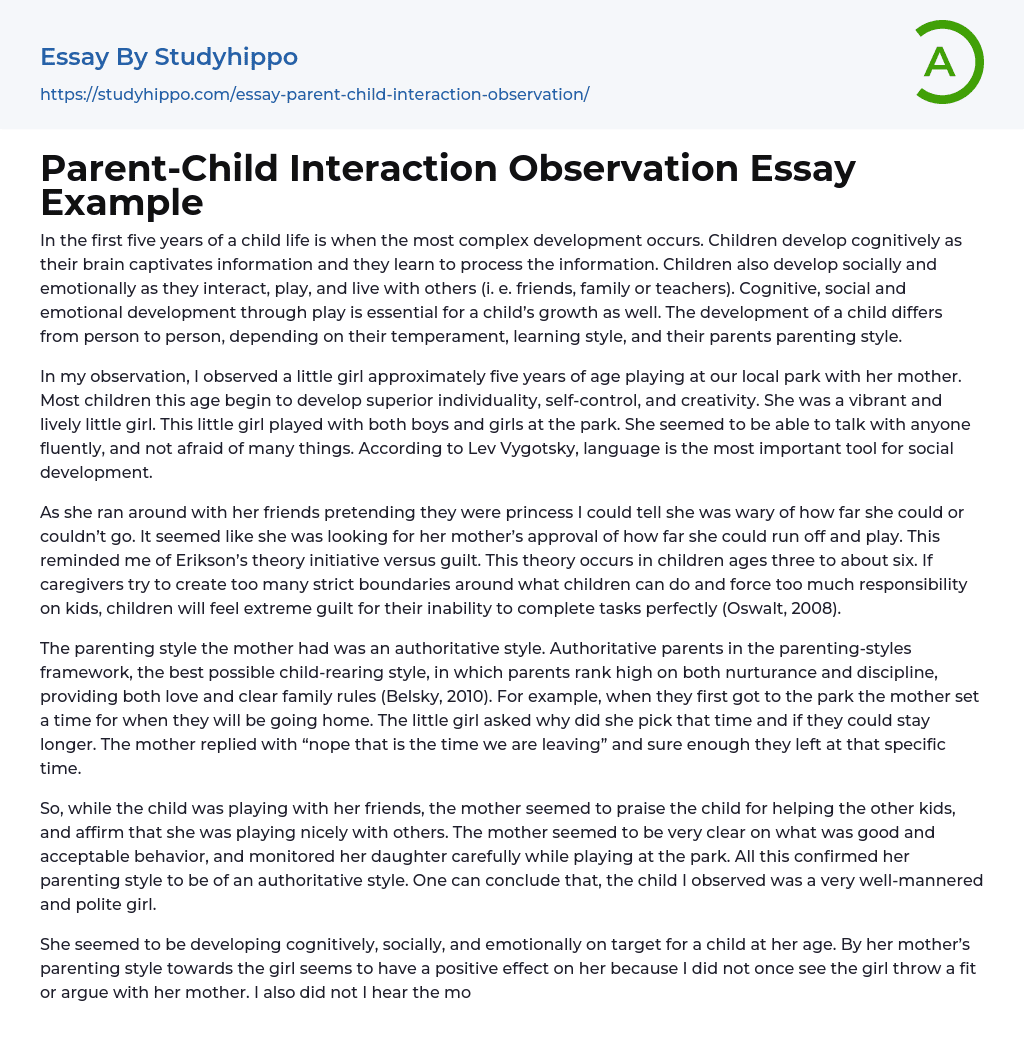The first five years of a child's life are characterized by complex growth, as cognitive development occurs through the absorption and processing of information. This period is also significant for their social and emotional development which is influenced by interactions, play, and living with others such as classmates, family members or educators. Participating in play activities is vital for a child's cognitive, social and emotional progress. Every child has a unique developmental journey, influenced by factors like inherent temperament, preferred learning methods or their parents' approach to upbringing.
From my viewpoint, I observed a young girl around five years old engaging and playing with her mother in our local park. At this stage of development, it's typical for children to begin developing their individual character, self-control skills, and creative thoug
...ht processes. This little girl was energetic and lively in her behavior. She actively engaged with all the kids at the park regardless of their gender. It seemed as if she had no reservations about chatting freely with everyone there, showing hardly any indications of discomfort or apprehension. Drawing from Lev Vygotsky's theory, language plays a crucial role in facilitating social advancement.
Observing her play pretend with her buddies as princesses, I noted her caution in gauging the extent to which she was allowed to venture. It appeared that she was also seeking her mother's permission for how far she could wander and enjoy her playtime. This situation called to mind Erikson's theoretical concept of initiative versus guilt. This psychological principle typically applies to children aged three to nearly six. If adult caregivers impose overly severe restrictions on children's activities and impos
a disproportionate amount of responsibility on them, these kids can be laden with severe guilt for their perceived inability to flawlessly carry out tasks (Oswalt, 2008).
In relation to parental methods, the mother exhibited a style of authoritative parenting - an optimal child-rearing strategy that combines love and discipline (Belsky, 2010). This is characterized by expressing affection while also maintaining strict household regulations. A case in point was their visit to the park when the mother set a pre-determined departure time. Her daughter's inquiry about extending their stay was met with resolute denial; she reassured her they would stick to the planned schedule. True to her promise, they departed at the stipulated time.
Hence, even as the young girl was fully engrossed in playing with her friends, it was evident to observe her mother's admiration of her readiness to help others and how she communicated effectively. Her mom watched closely at how she behaved herself in the park, giving clear signals about what conduct was considered suitable. This highlights her authoritative parenting approach. From watching this child, one can infer that she is notably courteous and well-mannered.
The girl appeared to be progressing aptly in her cognitive, social, and emotional development appropriate for her age. The girl's mother seemed to have a positive influence on her by her approach to parenting. Not once did I observe the girl causing a scene or engaging in an argument with her mom. Correspondingly, the mother was never observed raising her voice or repetitively instructing the child to follow her commands. Furthermore, it suggested that the girl had attained her developmental milestones
concerning learning, playing, speech, and behavior.
- Single Parent essays
- Single Parenting essays
- Child essays
- Child labor essays
- Childcare essays
- American Dream essays
- Barriers To Entry essays
- Capitalism essays
- Central Bank essays
- Compensation essays
- Consumerism essays
- Economic Development essays
- Economic Growth essays
- Economic Inequality essays
- Economic System essays
- Economy essays
- Employment essays
- Export essays
- Finance essays
- Free Trade essays
- Gross Domestic Product essays
- Human Development essays
- Income Inequality essays
- Industry essays
- Inflation essays
- International Business essays
- International Trade essays
- Macroeconomics essays
- Materialism essays
- Max Weber essays
- Microeconomics essays
- Minimum Wage essays
- Monetary Policy essays
- Monopoly essays
- Pricing essays
- Profit essays
- Recession essays
- resources essays
- Taxation essays
- Trade essays
- Unemployment essays
- Warehouse essays
- World economy essays
- Adoption essays
- Aunt essays
- Babies essays
- Bedroom essays
- Caring essays
- Children essays
- Daughter essays




